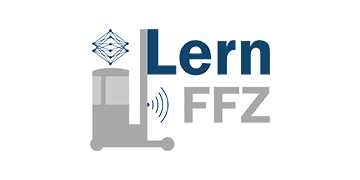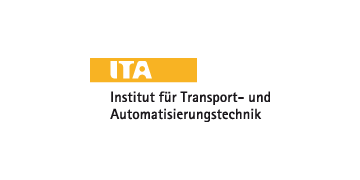| Theme | Artificial Intelligence, Automation, Automated guided vehicles |
|---|---|
| Project title | Imitation Learning for the Transfer of Human Skills to Industrial Trucks (LernFFZ) |
| Project duration | 01.12.2023 – 30.11.2026 |
| Download |
Industrial trucks can automatically transport load carriers, such as pallets, in logistics environments. However, automated load handling requires sufficiently precise positioning and alignment of the load carriers in line with the process. Complex situations during storage and retrieval, where automated systems have so far reached their limits, are usually easily solved by human drivers – thanks to their skills such as flexibility, speed of action, comprehension and experience.
The LernFFZ research project aims to transfer these skills, which were previously reserved for humans, to automated AGVs for the first time thanks to artificial intelligence (AI). To this end, the implicit knowledge of experienced drivers is recorded and formalized by means of information fusion of driving data recording and environment detection. Based on this, the AI of a semi-automated AGV will be trained to prescribe and independently execute driving movements based on the implicit knowledge of experienced drivers (imitation learning).
As part of the LernFFZ research project, IPH is developing synthetic training data sets based on an intralogistics simulation environment, which record and reflect expert knowledge with the help of a simulator. Furthermore, IPH supports the development of imitation learning algorithms and the simulation-based evaluation of these algorithms.
Publications about the project
Industrial trucks play a crucial role in modern logistics, but their effective operation often depends on highly skilled human operators. Although there are already approaches for automated control, these do not have the flexibility, speed of action, comprehension, and experience of human drivers to cope with complex situations. This paper deals with pallet object recognition, which is fundamentally important for the implementation of a pose estimation algorithm. Based on this, this paper lays the foundation for a complete automation solution for industrial trucks.
Artificial intelligence, intralogistics, driverless transport vehicles
This work explores the challenges of fully automating in-house goods transport in environments where industrial trucks like forklift trucks remain necessary due to undefined load carrier positions and shapes. Imitation Learning (IL) is identified as a promising solution for vehicle control in repetitive tasks, yet its application in intralogistics is challenging by the dynamic complexity of industrial trucks and the large dimensional space involved. A Robot Operating System 2 (ROS2) framework is introduced, enabling the acquisition of driving data from both simulation environments and real-world demonstrators. The study also presents a network architecture combining a Convolutional Neural Network (CNN) with a Long Short-Term Memory (LSTM) network, facilitating end-to-end learning from spatial and temporal image data. The framework's effectiveness is evaluated using a dataset of expert driving maneuvers to assess the generalization potential of the IL-trained network in vehicle control in different scenarios. The research aims to demonstrate the utility of the proposed framework for data acquisition and validate IL as a control approach for industrial trucks that require generalization.
Imitation Learning, industrial truck automation, intralogistics, ROS2, load handling
Automated industrial trucks master difficult driving situations worse than humans – for now. New approaches based on artificial intelligence (AI) are intended to replicate human driving behavior and give automated systems more flexibility.
artificial intelligence, intralogistics, industrial trucks








